Comparative Study to Y Combinator Accelerator Program
Aspects that can be practiced by founders for startup development
In October 2019, Y Combinator (YC) made the list 100 startup builders who have succeeded in achieving growth and posted a total valuation of US$155 billion plus created more than 50 thousand jobs. Two from Indonesia, namely Payfazz (ranked 66) and Xendit (ranked 53) – coincidentally both are engaged in fintech.
Separately, team DSresearch get confirmation that the two startups are currently hooking up status centaur, alias booked funding of more than US$100 million, and continues to raise new funding to support business expansion. Its growth continues to increase after its participation in the acceleration program.
To DailySocial, Co-Founder & CEO of PayFazz Hendra Kwik explained that his company is currently in the middle of raising series B funding. "There are many [investors], most of them are strategic financial sector. Combined from investors hedge funds, there is late stage investors and strategic financial service investors. The process is still ongoing because we haven't closed it yet."
After launching in 2016 and following the acceleration in 2017, PayFazz's business is growing exponentially. Agency-based, currently they have 450 thousand active members with 2,5 million application downloads. distribution throughout Indonesia, with 40% concentrated in Java. Y Combinator and MDI Ventures became PayFazz's early investors.
Journey to Y Combinator
Basically YC is an acceleration program that targets startups in the early stages. With a selection and teaching mechanism that is considered relevant to the digital business model, participating startups are fostered to ensure that the solutions offered get the right market share. Docker, Reddit, Stripe, DoorDash, Airbnb and Dropbox are also alumni of the acceleration program that is billed as the best in the world.
To get there, there are a series of stages that must be passed. Vahanalytics Co-Founder & CEO Shivalik Sen tell his experience when joining YC Summer 2017. There are at least 5 stages that must be passed, starting from the very beginning, namely creating an account on the YC site. Second, there will be a series of forms to fill out. In addition to containing information about personal data, there are also some questions that are asked “tricky” about startups and their business models.
Sample questions:
- Why did you pick this idea to work on? Do you have domain expertise in this area? How do you know people need what you're making?
- Who writes the code, or does other technical work on your product? Was any of it done by a non-founder? Please explain.
- Please tell us something surprising or amusing that one of you has discovered. (The answer need not be related to your project.)
Even if it's just a form online, according to Shivalik this part is actually the most time consuming. The expected answer to each question is detailed, founder asked to tell stories as well as convince the YC team through supporting data. It is said that every question asked has been designed in such a way, so that there are various aspects – including technical and psychological – that can be captured by the jury from each entry given.
After the previous process is complete, all registered participants just have to wait some time after the registration deadline. Each participant who is declared to have passed the stage "screening" will get an email to conduct an interview via video call. It's about 10 minutes, ask founder answered questions that reaffirmed his understanding of the startup vision, business model and founder.
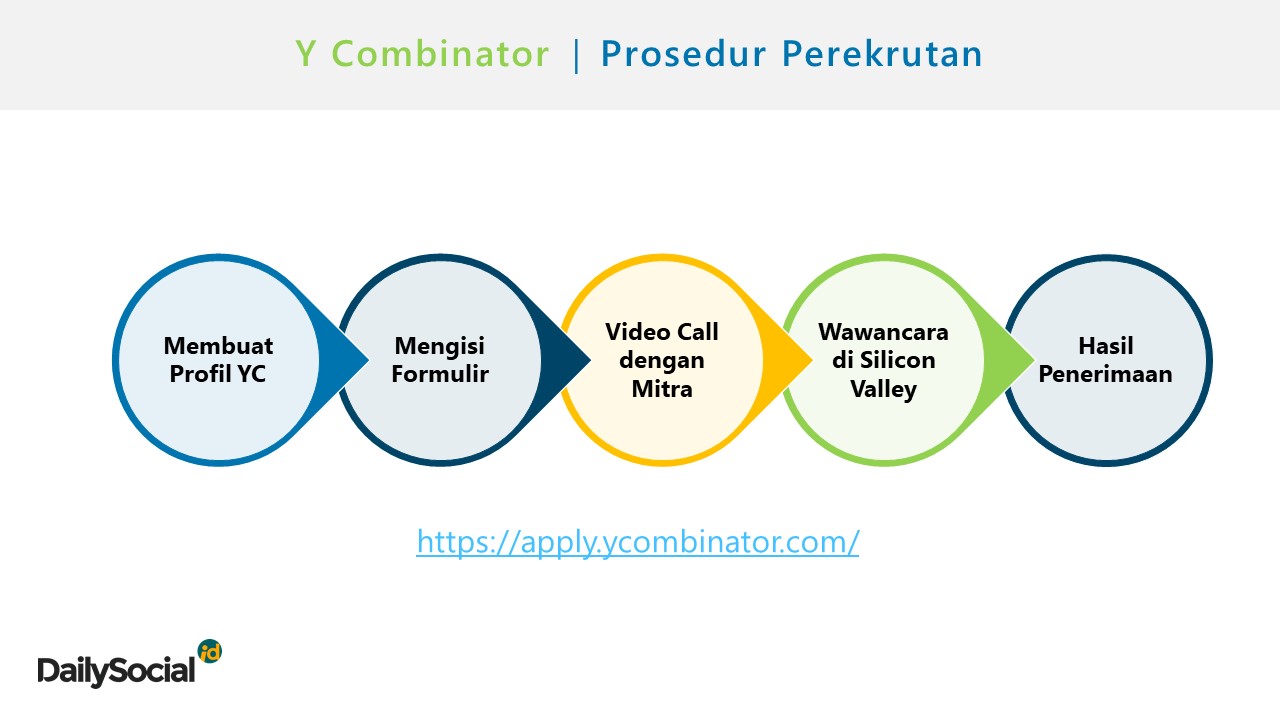
The video call is only an initial interview process, because then qualified participants will get an invitation to take part in a live interview with YC partners in Mountain View, California. Several partners will meet to ask questions, some of the common topics offered include:
- Tell us about what you're building.
- Tell us about your clients.
- Who are these people specifically (referring to the client)?
- It seems like you've got a solid team, a working product and your first paying clients, what's next?
- Have you thought about the XXX [country] market?
- So there are competitors in the XXX [country] already?
- Why haven't XXX [competitor] started using this?
- What about XXX [competitor] in the XXX [country] ?
- How are you going to accelerate growth?
- What kind of sales cycle are you looking at for this?
- How can you shorten this sales cycle and grow fast?
Even though it's already in Silicon Valley, it doesn't guarantee startups will be accepted. After the interview, YC partners will still discuss the results. For those who are still advanced, they will be notified to follow a series of processes after that, starting from acceleration to completion demo day.
Guide to achieving growth
At YC, startups are discouraged from adopting growthhacks. According to him, the approach to one of the program's important missions directs startups to long-term growth. Growth hacks set aside in order to minimize startup with haphazard actions in favor of an exponential matrix in the short term. Working closely with 25 business growth experts working in the world's technology companies, YC has concocting the approach himself in educating his fostered startups to achieve growth.
To achieve growth, of course, requires investment – both in the form of money, resources and others. At YC, every founder encouraged to check their respective retentions. For example by selecting a set of metrics that fit the business model. The chosen matrix should have implications for revenue and traction, not app downloads and so on. This retention includes three things, namely stability in the long term, in accordance with the average benchmark in the business vertical, and always growing new customer groups.
For early-stage startups, basically everyone is responsible for keeping the business growing. But at YC, through the initial funding received, startups will be asked to form a team growthitself as long as it has proven the retention points jointly defined by founder and mentors. For the first year, YC suggested the team growth consists of 1 product manager, 2-3 engineer and 1-2 data scientist.
Team average growth this particular set up after startup has at least 15 engineer and found strong retention. The most common mistake CEOs make is sticking around for too long to hire growth-focused PMs.
Tim growth good ones also play a capable "defense" role. This is also related to the launch and improvement of service features, usually development often misses user-related factors. Team growth the ideal has the ability to understand the root cause of the problem in minutes, while taking into account the anticipation for any negative impacts that occur. So PM recruitment becomes crucial. The standardization of PM recruitment at YC is to find people who are data oriented, have experience in the related field, and if possible have previously been founder startup
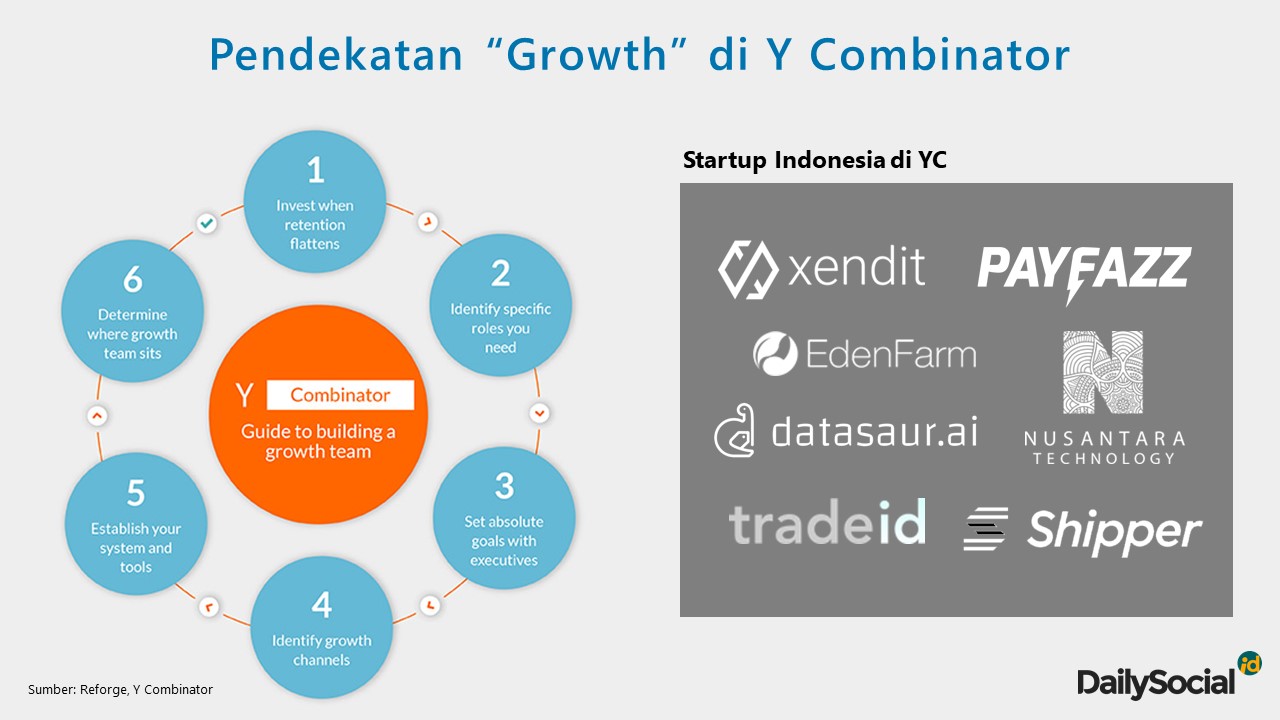
After having a team, YC will encourage its fostered startups to carry out a series of integrated initiatives in their initial year. First, define absolute goals and key business metrics. This absolute goal is defined as a target that is really defined measurably, in the form of definite numbers. For example, for O2O startups, instead of saying a 10% conversion increase target, it is better to set a target of adding 5 million new retail partners. If necessary, these goals are divided into more detailed sub-sections so that each point has a more realistic measure.
The next step for startups is to identify growth channels based on the behavior of existing users. Usually by answering questions like:
- How do customers find solutions/solve this issue today?
- How do your best users use your product today? Can you do something to get more users such as to discover the product quickly?
To monitor growth, the use of tools such as data sets, segmentation tools, experiment dashboards, and peer review processes is highly recommended. The dashboard helps the team to run various experiments and test the results before proposing each idea to add to the product. Here's an example of a dashboard implemented internally by Airbnb early in their development:
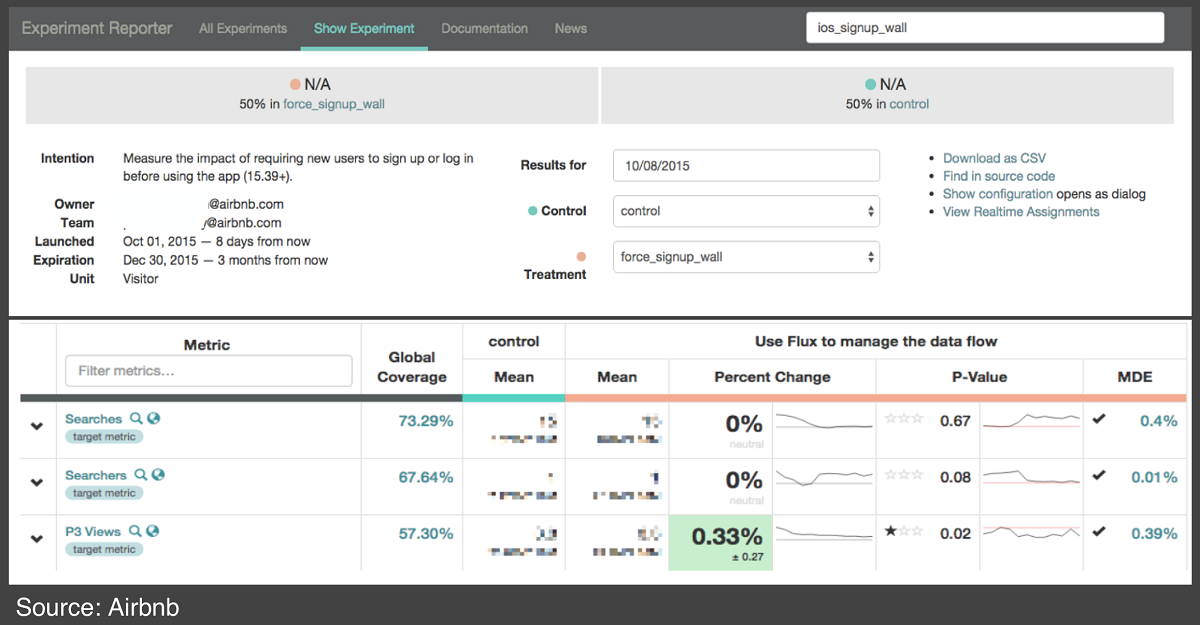
To strengthen all the hypotheses, user-research also need to be done. The principle is like this, the first 10 thousand users will have different characteristics from the second 10 thousand users. Sometimes the details of both cannot be found instantly through data alone, but must really ask for feedback. There are many approaches that can be taken, ranging from manual ones such as asking for input to semi-automatic ones by implementing track application UX.
Activity growth is a repetitive activity. So there will be a series of iterations until the business achievement continues to increase. When done right, the growth program will spread throughout the organization, making evidence-based mindset as part of the company's DNA.
Seeking series A pendanaan funding
Basically YC will only provide initial funding as the basic capital for startups to explore growth potential – realizing the materials that have been obtained in 3 months of education. However, the accelerator program also prepares startups to enter advanced funding, either by connecting/promoting them to their global network of investors or equipping them with business techniques.
Experts at YC have formulated the right timeframe for startups to raise series A funding. First, during the 6-12 months before the fundraiser, make sure founder has run the right metrics for its business. The key is to show impressive business development trend data. After that, make a story about the startup, the goal is to make investors believe and align with the visions to be achieved.
Then in this phase founder It is also recommended to start networking diligently. Although programs like YC facilitate investor networks, their active role founder will be decisive.
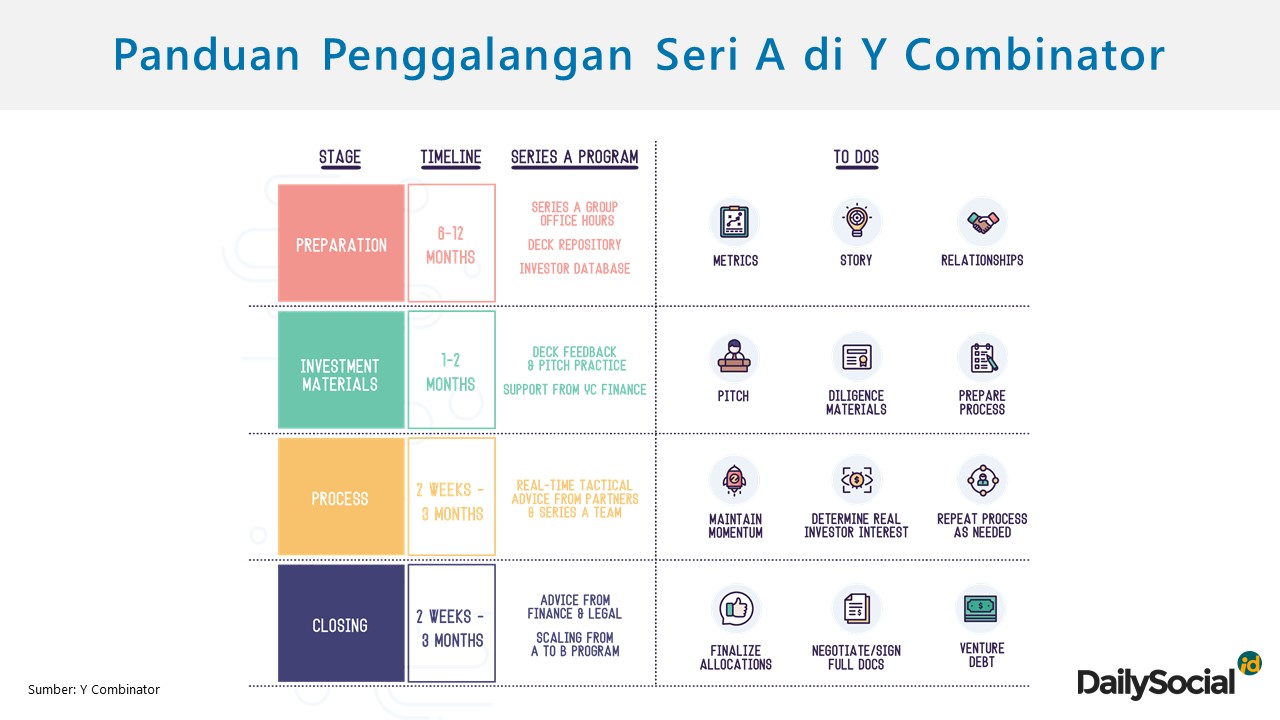
Then in the two months before fundraising actually launched, founder must determine exactly how much funds you want to collect, including the plans to be promoted. Then, YC also always recommends startups to make backup plans, contains actions to be taken when fundraising fails. Because it could be that investors need more time to see proof of startup performance and commitment founder towards business. At this stage founder also need to start learning presentations, to articulate goals and expectations in a pitch deck.
Close to time pitching, approximately one month before the fundraising process actually begins, founder should really focus on doing it. Even YC recommends that if the CEO's job is too busy, he can delegate some of it to a professional or another team member who can take his place as co-CEO.
Count too pro-rate, also related to the shares to be awarded and remaining post-raising. This section usually requires the help of the legal team to formulate, while preparing the necessary supporting documents. Then after you are ready, start scheduling a meeting agenda with investors to carry out pitching.
Then do pitching, maybe several times while improvising if you find aspects that are lacking. Provide each investor with sufficient information about the status of the fundraiser to maintain a sense of urgency and get them to venture forward in the process. The follow-up process is important, so don't hesitate to ask.
Stories about acceleration activities
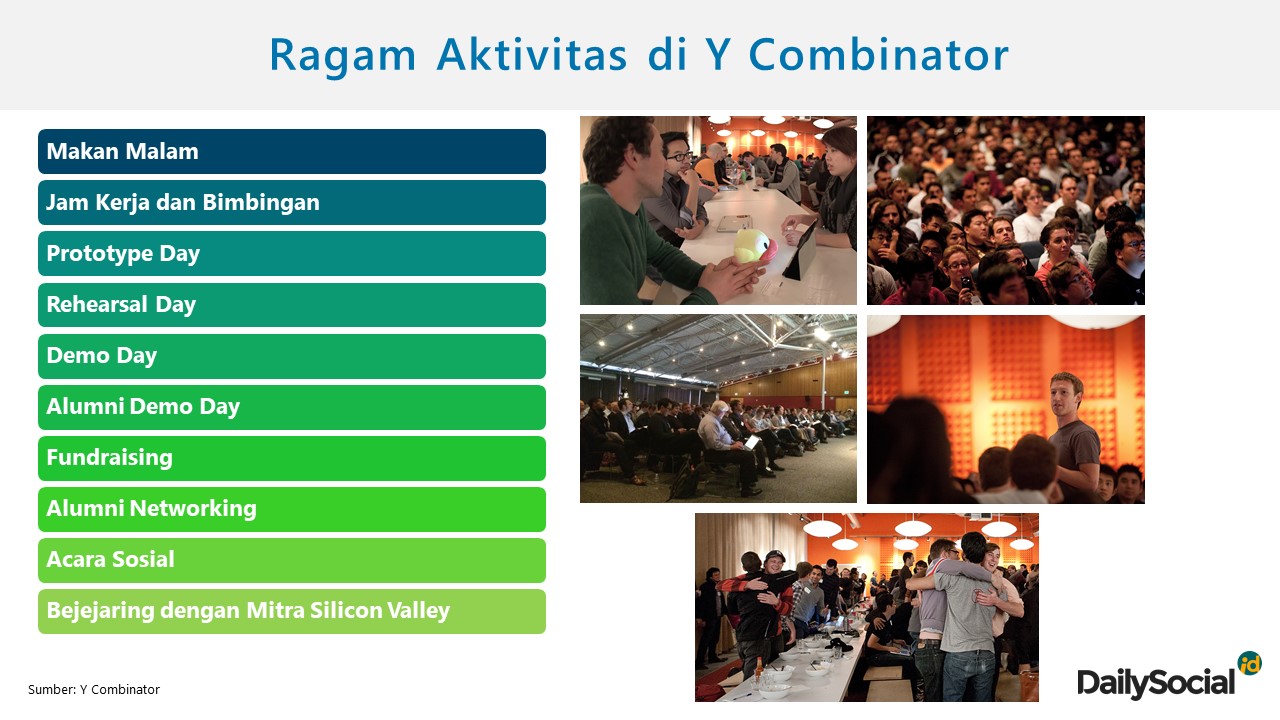
The YC acceleration program runs for three months, twice per year. The first session runs between January-March, then the second June-August. The selection process is usually opened in the previous months through the website. Every startup that is selected and funded will be required to attend Silicon Valley to carry out the education process. Together with partners and mentors, startups will work intensively to find the best form of business.
During the program cycle, YC organizes a dinner once a week, inviting various business figures in the startup world. Founders are encouraged to have “mini demo days”, while increasing connections with people who might be able to help grow the business. This dinner event is also a weekly deadline for each startup to complete certain tasks, and must be discussed during meetings.
Startups will also have working hours, occupying the spaces provided. Including doing activities mentoring individually. The time is quite flexible, like today's startup working hours. Every day the talks will focus on issues and startup growth phases.
Then the climax of the event was demo day, can be attended by up to 1000 investors. The focus is on presenting their product or service, making sure that what they do can get good traction. Because after the acceleration process, startups often change ideas or features in their services. The session was also an opportunity for founder to mingle with investors, while introducing yourself and attracting interest for the next funding round.
After demo day, the YC team remains in close contact with startups to help negotiate follow-up fundraising. Instead of time demo day, YC does suggest fundraising to be done at separate times, not too early. Besides that, there are actually events like prototype day and rehearsal day in a more relaxed format. demo days also run for YC alumni in separate time frames.
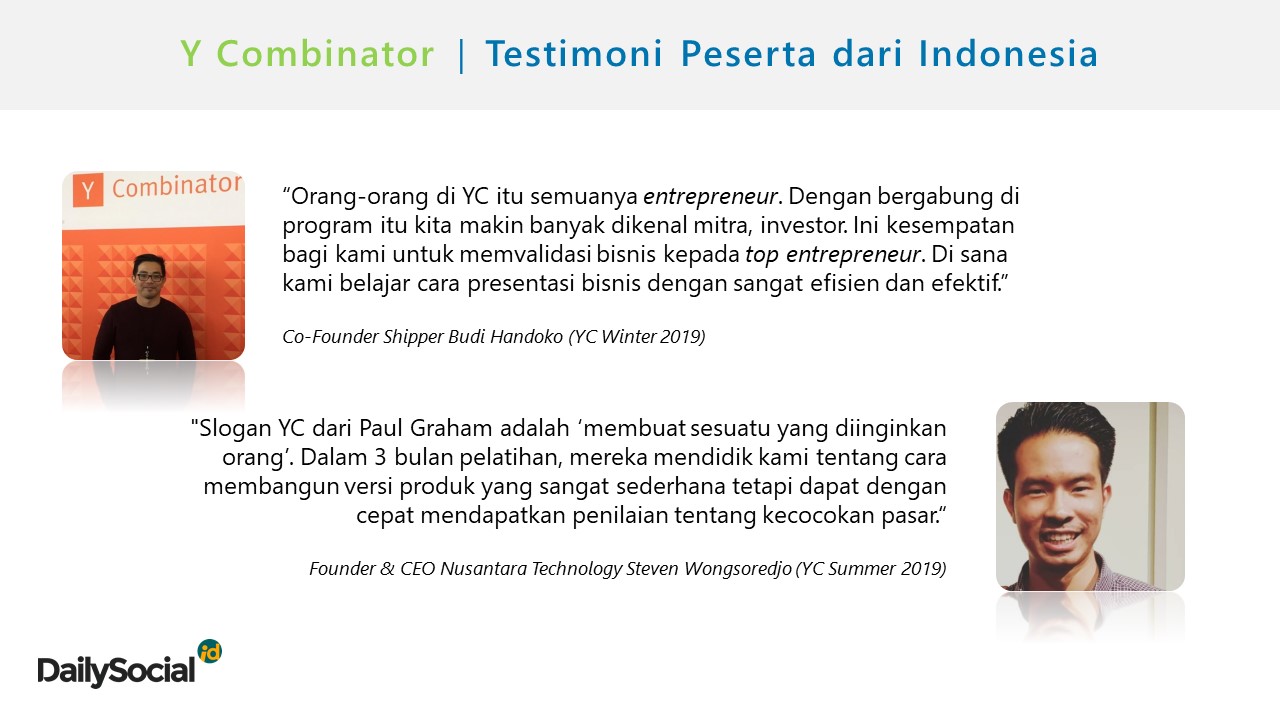
Because the alumni network is also continuously maintained, and YC is considered the most powerful for networking in the startup world. Not only because of its size, but a strong commitment to helping each other.
Sign up for our
newsletter
